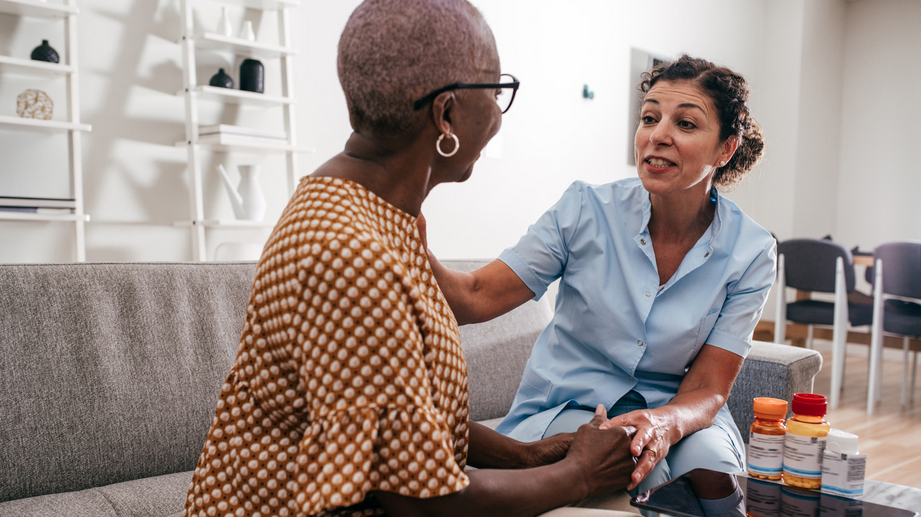Finding Strength in Adversity: Supporting An Elderly Loved One Through a Cancer Diagnosis

Learning that your senior loved one has cancer can be devastating and is often one of the most unsettling and life-altering situations we encounter. Your senior’s thought of happy retirement is being replaced with life-threatening concerns. In an instant, someone who has been your source of comfort and strength now needs your support as they navigate the emotional, physical, and financial challenges of a cancer diagnosis.
Feeling overwhelmed and powerless in the face of cancer is completely natural. As caregivers, you can often feel overwhelmed and unsure how to support your loved ones and yourselves during such a difficult time. However, it is important to remember you are your seniors’ primary support system. While cancer can be scary, it is not the end. With love, encouragement, and compassion, you will be able to help your senior loved one learn how to cope with their disease and treatment, as well as adjust to the lifestyle changes that occur during this time.
By providing a solid base of support for your loved one through cancer diagnosis, you will ease their stress throughout this tumultuous time in their life. As a result, they will have more energy to devote to recovery.
Strategies for Supporting Your Loved One
It is impossible to make cancer go away in an instant. However, there are things you can do to help your loved one manage their illness and feel supported and empowered by the help you provide. These strategies can help alleviate some of the stress experienced by both you and your loved one as they navigate through cancer care and treatment.
1. Give Them the Space
When a senior loved one learns they have a life-threatening illness, they often experience an immediate moment of disbelief followed by an onset of extreme emotions and eventually the feeling of a heavy weight being left behind that seems impossible to shake.
When a senior loved one tells you they have cancer, it’s natural to feel a wave of anxiety and the need to immediately offer their help and support. However, it’s important to give your loved one space, so she is able to decide what’s best for her without feeling pressure or having demands put on them.
Furthermore, as caregivers, the best thing you can do at that moment is to ensure that you are there for them when they need someone to talk to. These gestures of love and support will allow the situation to unfold naturally without the guilt of feeling like you should have said or done something different.
2. Listen to Them

As your senior loved one begins to come to terms with their cancer diagnosis, they will likely express a range of emotions. Try to listen to them without judgment and with an open mind. This can be challenging, especially when you are feeling the urge to make things better for them.
However, remember that your loved one is going through a great deal of stress and anxiety, so the best thing you can do is to let her have their say without insisting that they articulate things in a certain way.
3. Give Advice Only When Asked
As the caregiver, you may feel like you are your loved one’s only lifeline during this time of crisis. You are often going to take on the responsibility of researching the diagnosis and treatment options. This can be very beneficial, as the information is often overwhelming. What’s not helpful is saying, “You must do that,” or “You need to try this.” Instead, allow your senior loved one to know you have done the research and allow her to decide if she wants to hear more.
4. Educate Yourself About Cancer
Even if your loved one lives with you, educating yourself on the cancer diagnosis and treatment options is important. Being completely knowledgeable on all aspects of cancer will allow you to be a more effective support system for your loved one.
There are lots of helpful resources for information and support if you need additional help. Cancercare provides a wealth of information on many cancer types and physical symptoms associated with cancer. These resources are meant to empower and educate caregivers to help them feel more confident and knowledgeable about their loved ones’ cancer care.
As part of your responsibility, when you hear about other people having cancer, share your knowledge with your senior loved one, so they know what is going on in their community regarding cancer.
5. Support Senior Loved One’s Treatment Decisions

When your loved one is faced with deciding on treatment, it’s important to reassure them of what they are going through. Let them know that you understand and that you respect their choices regarding treatment for their cancer. Here are some ideas:
- Listen attentively to what the doctor says about treatment options; however, before you make recommendations, consider whether these are affordable or feasible for your loved one.
- Discuss how you feel about a particular treatment plan. Be open about how you feel about the various options, and listen carefully to your loved one’s feelings as well.
- Let your loved one know you understand why they want to put their health in their own hands and understand if they are not choosing a certain treatment plan; you will still be there to support them. Share your best ideas on alternatives that can help your loved one feel better and increase your comfort level.
- Let them know they have your unconditional love, even if they don’t choose a particular treatment plan. Remind them that cancer is not the end, even when faced with a difficult journey.
6. Offer to Help With Responsibilities of Daily Life
It can be physically and mentally draining when your loved one is receiving cancer treatment. You can offer to help with daily responsibilities, so they have more energy to devote to treatment.
Some examples of common daily tasks include:
- Helping them with housework by doing the laundry, dishes, vacuuming, dishes, etc.
- Helping them with meal preparation.
- Getting the groceries for the week (if possible)
- Preparing meals for your loved one if they are unable to do so themselves.
Aside from helping them handle day-to-day tasks, there are other tasks you can do in your role as a family caregiver, including:
- Making sure medications are refilled when needed.
- Ensuring your senior parent takes the right medications.
- Taking them to and from doctor’s appointments
- Helping your elderly deal with the side effects of cancer treatment
7. Prepare for Common Challenges
There are certain common challenges that can arise when a senior loved one is receiving cancer treatment. So, you must be ready for it. Some common conflicts include:
1. Thoughts of not being able to continue with treatment – Your senior loved one may feel that the cancer treatment is too much for him to handle and may even consider not going through it.
Here you must reassure your loved one that the treatment is an important part of their life, and they need to do it. If you are concerned that they are not going to be able to continue with the treatment, seek the help of a medical professional or a close family of hers to encourage them to do it.
2. Difficulty staying motivated – Your loved one may feel that everything has ended and they can no longer do the things they used to. This is a very common concern among people with cancer.
Here you must encourage your loved one and try to keep them motivated. This can be done by suggesting different activities that she used to enjoy when she was healthy. Take her for long walks, sing karaoke, or just cook together. These activities will help your loved one remember the good times and stay motivated.
3. Anger and depression – Your loved one may feel angry about their cancer and the treatment. There is a strong chance that they will become depressed about it.
Here you must talk to your loved one about how frustrated they are feeling and make sure that you listen to them without interrupting them. Let them talk as much as they need to, and let them get most of their frustrations out of their system. Once your loved one is done talking, share your own feelings with her.
8. If Financially Feasible, Consider Home Care

Being burned out is the biggest concern for caregivers, and it’s a likely situation for you if you are taking care of your loved one yourself. If finances allow, you can hire a home care attendant to help with cancer treatment. For instance, a registered nurse will help manage medications and medical treatments, while CNA can help with grooming, dressing, bathing, and meal preparation.
You need to know that not all health care providers are the same. The best way to ensure that you find a reliable home health provider is to check references and credentials of the Homecare agency or individual caregivers recommended by friends or seniors centers in your area.
Final Thoughts
A cancer diagnosis in an elderly loved one can be devastating. However, it is important to remember that they can still maintain their dignity and quality of life if they have the right support. By understanding the challenges they may face, offering emotional and practical support, and advocating for care and resources, families can create a more positive experience for the patient and the entire family. Ultimately, it is possible to find strength and hope in adversity.
Serenity Senior Care can be your partner in supporting your loved one through their cancer diagnosis and treatment. We provide a wide range of services that can help seniors maintain quality of life and dignity throughout the process. Also, our professional caregivers are trained to help seniors with emotional issues that often come with a cancer diagnosis. If you are looking for home care services in the New Jersey area, please contact us today.


